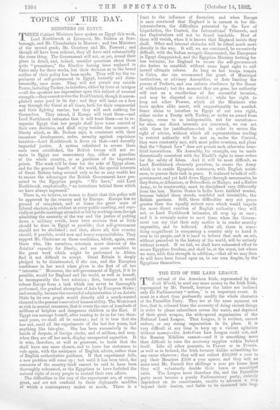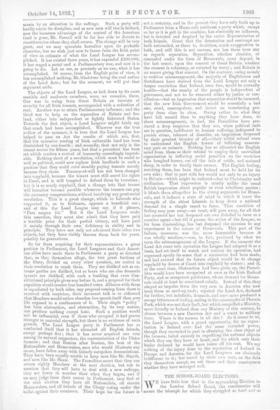THE END OF THE LAND LEAGUE.
THE refusal of the American Irish, represented by the Irish World, to send any more money to the Irish Irish, represented by Mr. Parnell, because the latter are inclined only for Parliamentary " action," is an important event. It must in a short time profoundly modify the whole character of the Parnellite Party. They are at the same moment set free, that is, released from the necessity of doing violent things in order to please subscribers across the water, and deprived of their great weapon, the wide-spread organisation of the National Land League. That League, it is evident, cannot endure, or any strong organisation in its place. It is very difficult at any time to keep up a violent agitation without money—the Anti-Corn Law League could not, and the Russian Nihilists cannot—and it is something more than difficult to raise the necessary supplies within Ireland itself. Like all other peasants, in France or in Prussia, as well as in Ireland, the Irish farmers dislike subscribing for any cause whatever ; they will not collect £50,000 a year to pay their Members £500 a year apiece, and they will no more send Mr. Parnell five shillings a year per house than they will voluntarily double their taxes or municipal rates. . The League must therefore die, and the Parnellite party must become a purely Parliamentary party, entirely dependent on its constituents, unable to advance a step
i beyond their desires, and liable to be shattered into frag- ments by an alteration in the suffrage. Such a party will hardly retain its discipline, and as new men will'rise in Ireland, now the immense advantage of the control of the American fund is gone, Mr. Parnell will be far less able to dictate to constituencies whom they shall return. The change will be very great, and we may speculate hereafter upon its probable character, but we wish just now to frame from the Irish point of view an estimate of what the Land League has accom- plished. It has existed three years, it has expended £200,000, it has waged a social-and a Parliamentary war, and now it is going to die. Let us see, as precisely as we can, what it has accomplished. Of course, from the English point of view, it has accomplished nothing, Mr. Gladstone being the real author of the Land Acts ; but for the moment, we will put that argument aside.
The objects of the .Land League, as laid down by its more sensible and moderate members, were, we conceive, three. One was to wring , from Great Britain an increase of security for all Irish tenants, accompanied with a reduction of rent. Another was to attain Parliamentary influence; and the third was to help on the separation of Britain and Ire- land, either into independent or lightly federated States. Towards the first object, a Land Leaguer might fairly say that much had been accomplished. Whoever was the true author of the measure, it is true that the Land League has helped to pass, an Act the results of which are, first, that the excessive renting of Irish culturable land has been diminished by one-fourth ; and secondly, that not only is the tenant secure for fifteen years, but that a precedent has been set which renders a revival of insecurity exceedingly improb- able. Nothing short of a revolution, which must be social as well as political, could now replace Irish landlords in such a position that they could evict steadily paying tenants merely because they chose. Tenancy-at-will has not been changed into -copyhold, because the tenant must still assert his rights in Court, and is still tempted to defend them by terrorism ; but it is so nearly copyhold, that a change into that tenure will hereafter become possible whenever the tenants can pay the necessary compensations, without involving any great social revolution. This is a great change, which to Liberals who supported it, as to Irishmen, appears a beneficial one ; and of this the Land League may say, if it pleases, " Pars magna fui." But if the Land Leaguers make this assertion, they must also admit, that they have paid a terrible price for their partial victory, and have paid it mainly through their own: deficiency in ability and in principle. They have not only not advanced their other two objects, but they have visibly thrown them back for years, possibly for generations.
So far from acquiring for their representatives a great position in Parliament, the Land Leaguers and their Ameri- can allies have made them in Parliament a party so detested that, as they themselves allege, the two great factions of the State, divided on every other question, are united in their resolution to crush them. They are disliked not as ex- treme parties are disliked, but as bores who are also domestic tyrants are disliked; with such a loathing that even Con- stitutional principle gives way before it, and a proposal for their expulsion would receive four hundred votes. Alliance with them is repudiated by both sides, any proposal coming. from them is received with suspicion, their incessant talk is so abhorred that Members would rather abandon free speech itself than pass life exposed to a continuance of it. Their single "policy ' has been obstruction, and obstruction, by its very nature, can produce nothing except hate. Such a position would not be influential, even if those who occupied it had grown stronger in material strength, but there is no evidence of such growth. The Land League party in Parliament has so conducted itself that it has alienated all English friends, except perhaps five ; that it 'has never acquired one vote among its natural supporters, the representatives of the Ulster farmers ; and that Session after Session, the best of the Nationalists and Home-rulers, men who would illustrate any cause, have fallen away with bitterly outspoken denunciations. They have been equally unable to keep men like Mr. Smyth, and men like Mr. Shaw. The Farnellites assert that they can return eighty Members at the next election, but not to mention that they will have to deal with a new suffrage, they are fewer in number than when they began, and if we may judge from their career in Parliament, may find at the next election they have all Nationalists, all sincere Home-rulers, and all friends of the Clergy voting under the ballot against their nominees. Their hope for the future is
not a certainty, and in the present they have only built up in Parliament from a Home-rule residuum a party which, except so far as it is grit in the machine, has absolutely no influence, but is detested and despised by the entire Representation of both Islands. Grant that the detestation and contempt are both unfounded, as there is,• doubtless, much exaggeration in both, Sand still this is not success, nor has there been any as regards separation. Separation, whether absolute, or concealed under the form of Home-rule, must depend, in the last resort, upon the consent of Great Britain, whether the consent is voluntary, or extorted by worry ; and Britain is no nearer giving that consent. On the contrary, owing mainly to reckless mismanagement, the majority of Englishmen and Scotchmen have derived from the Land League not only a deeper conviction that Ireland, once free, would be eternally hostile—that the enmity of the people is independent of grievances, and not to be removed either by justice or con- ciliation—but an impression that separation would be immoral, that the new Irish Government would be essentially a bad one, cruel, unscrupulous, and intent on transferring pro- perty from class to class. Owing rather to what they have left 'unsaid than to . anything they have done, to sheer mismanagement, in fact, the Parnellites have pro- duced a deep suspicion that they are, when political ends are in question, indifferent to human suffering, indisposed to punish crime, tolerant of disorder, an impression deepened by their greatest blunder of all,—their wilful refusal even to understand the English horror of inflicting unneces- sary pain on animals. Nothing has so alienated the English mind from them as their refusal to employ their unrivalled organisation in inflicting social penalties on the wretches who houghed horses, cut off the tails of cattle, and maimed sheep, in order to terrify their owners. The English feeling, watching them, has been that Ireland must ho held for its own sake ; that to part with her would not only be an injury to Britain—which might be endured—but to Christianity and civilisation. That impression is utterly unlike this usual British impression about popular or even rebellious parties ; it blinds them altogether to the strong arguments for Home- rule, and it induces a state of mind in which it taxes the strength of the ablest Liberals to keep down a national demand for a simple resort to force. That condition of feeling may pass away—we trust, will pass away, for all that has occurred has but deepened our own disbelief in force as a curative agent—but till it passes, the action of the League, so far from diminishing, has but deepened the aversion to any experiment in the nature of Home-rule. This part of the failure, moreover, was the more lamentable because .it was wholly needless,—was, in fact, produced by what we term the mismanagement of, the League. If the moment the Land Act came into operation the League had adopted it as a basis, bad set itself to watch and enforce its operation, had expressed openly its sense that a concession had been made, and had avowed that its future object would be to change copyhold by decree of Court into copyhold by statute ; and if, at the same time, Obstruction had been given up, the Parnel- lites would have been recognised at once as the Irish Radical Party, and as competent politicians, whose demand for Home- rule could at least be considered calmly. Instead of this, they obeyed an-impulse from the very men in America who now treat them as used-up tools ; rejected the Land Act, declared for further, but indefinite, demands, and once more produced a savage bitterness of feeling, ending in the catastrophe of Phoenix Park, which was not their fault, but which compelled a Ministry, more friendly to Ireland than any Ministry of this century, to choose between a new Coercion Act and a resort to military force. Where is the success in all this I As it seems to us, the Land League, with a grand opportunity, for no organ- isation in' Ireland ever• had the same extended power, though they succeeded in part in obtaining the class object of the farmers, failed entirely in expediting the national objects which they say they have at heart, and for which only their leader declared he would have taken off his coat. We say nothing of the injury done to the reputation of Ireland in Europe and America, for the Land Leaguers are obviously indifferent to it; but tested by their own tests, on the data they themselves accept, we ask them and their countrymen whether they have managed well.



































 Previous page
Previous page